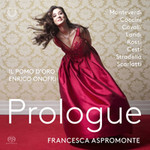|
Back
06/16/2018
“Prologue”
Claudio Monteverdi: L’Orfeo: Toccata and Prologue “Dal mio Permesso amato”
Giulio Caccini: L’Euridice: Prologue “Io che d’alti sospir”
Francesco Cavalli: La Didone: Sinfonia and Prologue “Caduta è Troia” – L’Eritrea: Prologue “Nelle grotte arimaspe” – L’Ormindo: Sinfonia and Prologue “Non mi è Patria l’Olimpo”
Stefano Landi: Il Sant’ Alessio: Sinfonia and Prologue “Roma son io”
Luigi Rossi: Il palazzo incantato overo La guerriera amante: Prologue “Vaghi rivi”
Pietro Antonio Cesti: Il pomo d’Oro: Sinfonia and Prologue “Amore et Imeneo” – L’Argia: Sinfonia and Prologue “De’ gotici splendori”
Alessandro Stradella: Sinfonia a due violini e basso – La pace in catenata che dorme, si risveglia e dice: Prologue “Con meste luci”
Alessandro Scarlatti: Gli equivoci in amore, o vero la Rosaura: Sinfonia and Prologue “Cessate, oh fulmini!”
Francesca Aspromonte (soprano),
Il pomo d’oro, Enrico Onofri (conductor)
Recording: Teatro della Voce, Treviso, Italy (December 19 - 22, 2016) – 74’31
Pentatone SACD PTC 5186 646 – (Distributed by Naxos of America) –
Texts in Italian, English, French and German – Notes in English, French and German

   
From rather unlikely material Pentatone has produced a delightful surprise. “Prologue” is exactly as titled: soprano Francesca Aspromonte performs prologues from 11 operas from the 17th century.
The prologue often confronts the audience with a puzzling blizzard of obscure classical references that delays the start of the opera’s action. Ms. Aspromonte gets to voice abstract “characters”, such as Music, Tragedy, Peace in Chains, or The Glory of Austria when she is not expressing Venus, Cupid or Iris, goddess of the dawn. (And in Landi’s work she is Rome itself.) This might sound dry, but the soprano is by turns lively, solemn, flirtatious, and ironic, and the 10 members of Il pomo d’oro (with extra brass for Monteverdi’s fanfare) display a similar range of expression. The classical references come thick and fast, but this turns out to be an essential part of the fun.
Until recently one could go through life without ever encountering one of these antique works, but recently alert people in favoured locations have had the opportunity. It is probably not wise to try to listen to this entire recording in one go, but it is easy to become entranced by the singer’s alluring ways. The CD is both a reminder of the riches within these operas and a vibrant introduction to a vibrant repertoire.
Michael Johnson
|